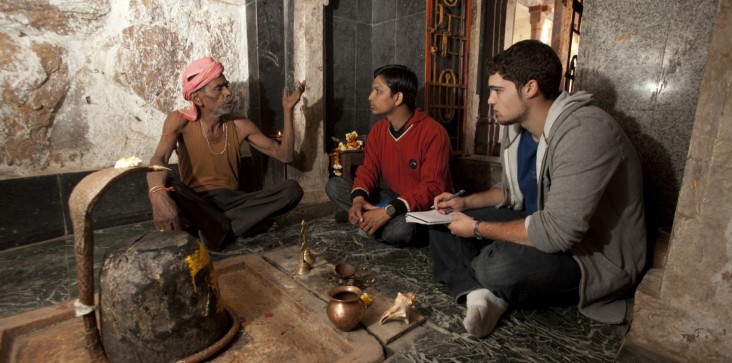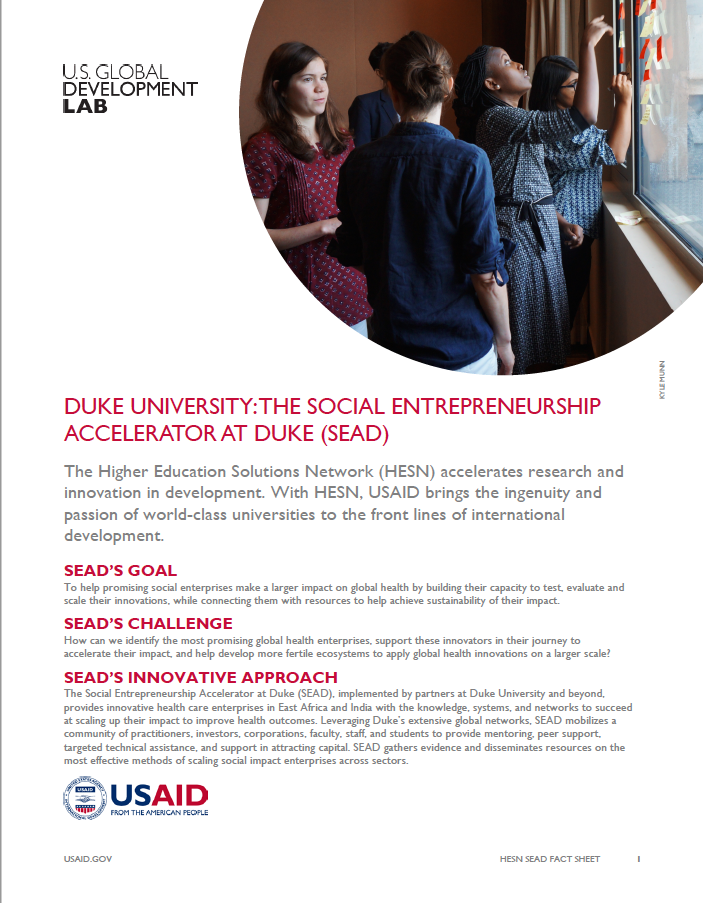- What We Do
- Agriculture and Food Security
- Democracy, Human Rights and Governance
- Economic Growth and Trade
- Education
- Ending Extreme Poverty
- Environment and Global Climate Change
- Gender Equality and Women's Empowerment
- Global Health
- Water and Sanitation
- Working in Crises and Conflict
- U.S. Global Development Lab

SEAD's Goal
To help promising social enterprises make a larger impact on global health by building their capacity to test, evaluate and scale their innovations, while connecting them with resources to help achieve sustainability of their impact.
SEAD's Challenge
How can we identify the most promising global health enterprises, support these innovators in their journey to accelerate their impact, and help develop more fertile ecosystems to apply global health innovations on a larger scale?
SEAD's Innovative Approach
The Social Entrepreneurship Accelerator at Duke (SEAD), implemented by partners at Duke University and beyond, provides innovative health care enterprises in East Africa and India with the knowledge, systems, and networks to succeed at scaling up their impact to improve health outcomes. Leveraging Duke’s extensive global networks, SEAD mobilizes a community of practitioners, investors, corporations, faculty, staff, and students to provide mentoring, peer support, targeted technical assistance, and support in attracting capital. SEAD gathers evidence and disseminates resources on the most effective methods of scaling social impact enterprises across sectors.
Scaling the Impact of Innovative Global Health Social Enterprises
SEAD identifies growing nonprofit and for-profit enterprises with operations in East Africa and India that have experienced initial success in developing potentially transformative ways to address challenges in global health. SEAD provides these enterprises with a three-year program of support focusing on overcoming obstacles that social enterprises commonly face in scaling up their impact. Topics include refining scaling strategies, understanding behavior change, forming strategic partnerships across sectors, managing organizational growth, accessing funding, and assessing performance.The program includes the annual SEAD Summit at Duke, field visits by the SEAD team to meet with innovators, collaborations among innovators and experts, and coaching from SEAD partners.
The program includes the annual SEAD Summit at Duke, field visits by the SEAD team to meet with innovators, development of a regional SEAD office in East Africa, collaborations among innovators and experts, and coaching from SEAD partners.
The SEAD network currently includes 25 global health enterprises. Examples include:
- Safe Water & AIDS Project increases access to health care in rural Kenya through a Community Health Promoter network 6,300+ individual vendors providing health education and door-to-door sales of health/ hygiene products. • In India and Cambodia, Operation ASHA combats the spread of drug-resistant tuberculosis by using SMS messages and biometric technology to ensure patients stay on their treatments.
- LifeNet strengthens local healthcare capacity, by partnering with community health centers to build their medical and administrative capacity and connect them with necessary pharma/medical equipment.
- NorthStar Alliance manages a network of Roadside Wellness Centers using converted shipping containers.
Stimulating Impact Investing in Global Health
SEAD catalyzes global health impact investing by providing technical assistance to participating social enterprises and engaging investors interested in opportunities in the global health sector. SEAD has convened a Global Health Impact Investing Advisory Board of 23 diverse individuals including angel investors, asset managers, and asset owners. After conducting a market analysis to highlight challenges and opportunities in the field, SEAD convened investors to discuss the best ways to approach this relatively new area of investment. Results indicated that despite its inherent challenges, several recent market developments have generated considerable growth in activity around global health impact investing.
Generating and Disseminating Knowledge
Through its comprehensive program evaluation and complementary research endeavors related to impact investing and the innovation ecosystem, SEAD is committed to sharing insights from its work to help the development community better understand the factors that help and hinder the scale of impact of global health innovation. In collaboration with the Duke Global Health Institute, SEAD launched the Evidence Lab, which helps global health entrepreneurs evaluate their business model, impact on patients, and influence in the global health space.
Engaging Students and Faculty in Global Health Innovation
Through internships, fellowships, and more, students from Duke support SEAD innovators while developing a deeper understanding of social entrepreneurship and global health. SEAD also provides a range of on-campus programming to connect students to the work of the innovators and broader global health innovation. SEAD engages faculty across Duke, convening a research working group of faculty interested in global health innovation, providing research funding for faculty addressing global health innovation issues, and connecting faculty with SEAD innovators with aligned research interests.
Partners
At Duke University, SEAD is managed by a cross-university, interdisciplinary team that includes the International Partnership for Innovative Healthcare Delivery at Duke Medicine, the Center for the Advancement for Social Entrepreneurship at the Fuqua School of Business, and the Duke Global Health Institute. SEAD works in close collaboration with outside entities such as Investors' Circle, the world’s most successful early-stage impact investing network.
For more information
www.dukesead.org • facebook.com/DukeSEAD • twitter.com/DukeSEAD
The Higher Education Solutions Network (HESN) accelerates research and innovation in development. With HESN, USAID brings the ingenuity and passion of world-class universities to the front lines of international development. Since 2012, HESN has supported Development Labs at seven universities that engage students, researchers, faculty, and their partners in innovating scientific and technological approaches to the world's most challenging development problems. By evaluating and field-testing approaches in partnership with local institutions, HESN Development Labs identify solutions that are efficient, cost-effective, accessible, and sustainable, then strategize how to apply them on a large scale. With funding over five years from USAID and matching investments from the universities, the HESN network has grown into a vibrant collaboration among more than 650 partner institutions in academia, civil society, and government in more than 65 countries.








Comment
Make a general inquiry or suggest an improvement.